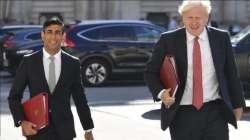UK Political Crisis: Who are in PM race, what's next in United Kingdom? EXPLAINED
UK Political Crisis: The entire world is worried with the developmenets in the economic crisis-hit United Kingdom as a further escalation of the crisis in the one of economic powers will affect the global economy.

UK Political Crisis: Embattled British Prime Minister Liz Truss on Thursday resigned as the Conservative Party leader saying she can no longer deliver the mandate she was elected on last month, ending her humiliating tenure at 10 Downing Street on her 45th day in the job following an open revolt against her chaotic leadership.Now, the question is what’s next for economic-crisis-hit nation? Will UK see a fresh election? Will Rishi Sunak take charge amid historic turbulence in the country.
Who are in the prime minister race?
Political observers said Rishi Sunak, who was defeated by Liz Truss in the party campaign, is the front-runner for the job. Former PM Boris Johnson may consider running again to be UK prime minister. Former Home Secretary Suella Braverman, who was sacked on October 19, may also contest for the PM post. Other likely contenders are- Penny Mordaunt, Kemi Badenoch and Tom Tugendhat.
What happens now?
The party says it will select a new leader and prime minister by October 28. Truss will remain prime minister until then. To avoid the need for a lengthy election campaign that could have left the country without an effective government for weeks, party leaders decided that lawmakers would have greater say in the choice and without weeks of hustings around the country.
Under the expedited process, challengers for the leadership must garner the support of 100 other Conservative lawmakers — out of a total 357 — by Monday afternoon. That means a maximum field of three for lawmakers to vote on. The last-placed candidate would then be eliminated and the top two candidates will face an online vote of the party membership.
What are the main hurdles?
The first challenge will come just days after the new prime minister takes office, when Hunt delivers his fiscal plan to the House of Commons on October 31. Truss triggered the crisis that led to her downfall when she and Hunt's predecessor unveiled plans for sweeping tax cuts without saying how they would pay for them and without providing independent analysis of their impact on government finances.
Since taking office last week, Hunt has reversed most of those cuts and promised to cut government debt as a percentage of economic output in the coming years. He has also warned that painful spending cuts will be needed during what's likely to be a “difficult” winter.
Opposition parties and some Conservative lawmakers are already pushing for increased spending in areas such as healthcare, welfare benefits, state pensions and free school lunches to shield the poorest in society from spiraling prices.
Why doesn't the UK have a general election?
Legally, the government isn't required to call an election until December 2024, five years after the Conservatives won a landslide victory under the then Prime Minister Boris Johnson. But opposition parties and some members of the public are demanding an immediate election after the uproar of recent months.
Truss was forced out of office after less than two months on the job and she followed Johnson, who resigned after his authority was undermined by a series of scandals. The damage done by Truss and Johnson has cratered support for the Conservatives, with some analysts suggesting they would lose many seats if an election were held today. Because of this, the new prime minister is expected to resist calls for an early election, and instead try to use the next two years to rebuild confidence before going to voters.
(With PTI input)
Also Read: UK PM Liz Truss resigns: What went wrong; Expert decodes failure of her leadership | 10 points